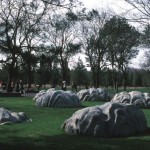Monday. Gordon (the guitar) and I had a nice long bedward session. Michael Enright was interviewing the astonishingly young, beautiful and good Nigerian writer Chimamanda Ngozi Adichie on the radio. (In Half of a Yellow Sun, she writes of the birth of Biafra in the ‘60s. Sounds powerful.) I like my right hand. I can get much more into the BlissyZone with finger picking than with chord changes. Male multi-tasking!
Tuesday. It was game 3 of the World Series, the first of the playoffs that I’d seen. First of the year. (Unbelievable. I still love that strange, timeless, slow game. I raced home from October school days to watch the Series as a kid. I played seriously into my 30s. I can still feel the bat in my hands, awake or asleep, in a way that I doubt a guitar will ever match.) Carpenter pitched brilliantly, and that turned the Series for the Cards. I watched over at my friends’ house, where I found not only a working television but that my buddy Fanfan is learning to play bass. Potential collaborator. I played long and lots. Had the room to myself ‘til the seventh inning, then the bullpen got too loud. These folks, two of them born in Canada, knew far less about baseball than I did about guitar two months ago. I tried to save them.
Wednesday. Lesson Night at the Ol’ Ottawa Folklore Corral, and it was a good night in the Old Dog guitar saddle. (How’s that for a mangled metaphor?) Asked questions. Got answers. Further to my mind-boggled reaction to the chords from last week’s “Study in E”, GG (Kurt the Guitar Guru) was able to quickly teach me the remarkable “E minor 11th” chord, which can also be played as “G 6-9”. It’s the opening chord to “Hard Day’s Night”, for one thing, and I’ve got it. Sounds good, right? Actually, it doesn’t. It’s ridiculously primitive. It’s just a brainless right-hand strum without a finger on the fretboard. (Ohh. I knew that.) The GG had lots to say about more significant things, like finger shapes. Learning to feel the chord shapes is the key. Sliding from one chord to another based on shapes, not notes, means that skilled guitarists are sometimes seen as “idiot savants” by other classically trained musicians. While they have had to learn the individual notes to a chord, good guitarists can intuit new chords quickly by adjusting their finger shapes or moving them up or down the fretboard. (I think that’s what the GG said. Musicians, forgive me when I know not quite what I am talking about.)
And then came Thursday. “I think you should come right away,” Big Sister said. Our dear Mum has been in steady physical decline for the past several years, and it looked like she was doing her final taxi toward spiritual takeoff. And she was. I took care of what I thought I needed to, including being ready for a funeral, packing for my youngest son and preparing to practise the guitar for however long we would be away from home. I grabbed Gordon, met Calvin Junior (and his own versions of Hobbes) at the school bus stop and hit the road running. We didn’t quite make it, but I had some quiet moments of reflection in her room, where her body still lay.
I didn’t think much about music. Aside from her love for hymns and her comically poor singing of them, music was never a big part of our life together. Baseball? Hockey? Books and books? Absolutely. When I was a kid, though, Mum would make occasional reference to my hands: “Look at those fingers! You’re going to either be a surgeon or a concert pianist.” Well, I did almost get into medical school one year, but musical virtuosity was unlikely since lessons were never even suggested. It occurs to me that my impracticality stems more from my mother than I had thought. She’s always been a woman of grand dreams, and her vision of a generous, funny and welcoming family life was realized in the most vivid way, especially in the generation of her 13 grand-kids. Later, as we shared Enid stories, someone told of a young writer friend who had told Mum of an ambition: to win a (remotely conceivable) literary prize. (It might have been the Pulitzer.) Mum’s response was characteristic and quick. “Why not the Nobel?” Ah, but a man’s reach should exceed his grasp, or what’s a heaven for? (Enid Howden quoting Robert Browning. Time and again. Burden and blessing.)
So, decades after I began to notice my own rabid interest in music, and after years of fascination and envy at the musical progress and accomplishments and satisfactions of my own kids, I embarked on this Old Dog Year. I decided to do something about a hypothesis I’d had for awhile. Maybe I am a bit musical. And with my athletic ability in free-fall, maybe I should work at something I can get better at in mid-life, without a need for youth or functional ankles. ‘Cause they ain’t comin’ back. I now feel that among the many lofty and wonderfully principled ideas my Mum had planted in me, this seed of musicianship was among them. It wasn’t well-nourished, mind you, but it was there. It was the classic “castle in the air”, which another strain of my childhood had derided. Quit your dreaming, boy. Get down to business. What a little absent-minded professor he is! And I hated that stuff, that accusation that I was cloud-bound, impractical, a dreamer.
But although I function reasonably well in this allegedly Real World, I came to understand as an adult that I clearly was all of those things, and an idealist and a hope-filled romantic, too. So was my Mum. And like me, she would have loved Thoreau’s take on dreamers in Walden: “If you build castles in the air, your work need not be lost; that is where they should be. Now build foundations under them.” So I do, in this case by pulling out my guitar every day. I thought later that I should’ve taken Gordon up and played a little in the stillness of her second-to-last room, but that wasn’t really us. (Among those souls I called upon that night to welcome Mum, though, was the old Cleveland Indians star Rocky Colavito. She’d been a great fan, and it seemed fun; the only problem was my discovery that he’s still alive. Ah, well.) Instead, I pulled out the guitar later at Big Brother’s place, where the clan gathered late into the evening, ostensibly to plan but mainly to remember. I softly fingered all the bits I can do without thinking. It felt a little like love.
Maybe all this explains, in part, why I’ve taken the long way ‘round to being a musician. (Wow. I just said I was a musician. It hardly even hurt! I do feel a giggle coming on, though.) It also took me a long while to become a writer. Chez Howden, it was reading, not writing; baseball, not music; and, in a larger sense, principles that regularly overrode pragmatism. I felt a certain joy in Mum’s passing. It was release from a limited and painful life for her. It was a superb family reunion: everybody was there, and the laughs were legion. But there was more than that, a sense of personal relief and of eagerness to live that I attribute to Mum’s example of both. Relief and contentment at the end of a well-lived and loving day, and a current of eagerness to do what I might to realize her hopes for all of us.
Right this moment, odd as it is, messing around with a guitar seems to be part of that. Amid stories and photographs, I picked some more at Little Sister and Silent Paul’s place the next night. I was a late-night guitar vampire for the next few days, using the quiet of Big Sister’s living room to go through my exercises and exercise my memories. At times it was a welcome escape from thinking, yet at others I felt as mindful as I could be. It was a rhythmically stumbling kind of meditation, peaceful moments to linger on the kindness of dear old friends and vaguely familiar faces from the old home town. Sorry for your loss. Condolences to you and your family. Enid was a great lady…
We stood by her grave — right next to my Dad’s — in the sweet sunlight of a warming autumn day, laying roses and praying and singing. (It was just the Howdens, and we actually sang pretty well, thanks.) I walked by my grandfather’s grave, past my old high school, around some of my favourite tree-lined and leaf-scented streets. Back by the fireplace at Big Brother’s, I spent a good part of the afternoon playing, including a welcome bit of stern rehearsal time with the Itinerant Artist. My eldest son, the IA, is a genuine musician, the Real Instrumental Deal, and has taught guitar for several years. He applied the Kenny Werner learning triangle – got to play slowly, and eventually combine the ability to play perfectly, at tempo and all the way through – in very specific ways to my practising. He beat out a very slow tempo, and insisted I match it. He showed me a technique for practising chord changes that avoids frozen frustration and encourages gradual acquisition of speed. It was sweet, personalized guidance and attention. (He also played, after my fingers were numb, many of the pieces I’ve struggled with, giving me some sense for how it sounds.) I’ve never felt so much at home with playing music.
That night, at a wonderful memorial for Enid H., our words of memory and tribute were in the forefront, but so was music. “How Great Thou Art” was sung with chest-busting force and beauty by a large congregation (there was a stealth tenor among the guests, and we rode his thunder. Wow.). And there are real live musicians in the next generation. Representing them, niece Bethany played a sweetly feeling “Fairest Lord Jesus” on the piano, and the IA followed later with a gorgeous solo trombone rendition – a bit jazzier than that small-town Baptish church has likely heard before – of “Just a Closer Walk With Thee”. I’m decades behind, and didn’t even think of playing guitar on that bill. But I’m on the job, I’m learning, and “if a job’s worth doing,” as Mum reminded us all ad infinitum, “it’s worth doing well.” I never played for my mother, but that’s okay. I am playing for her now, and hope to do it well.


